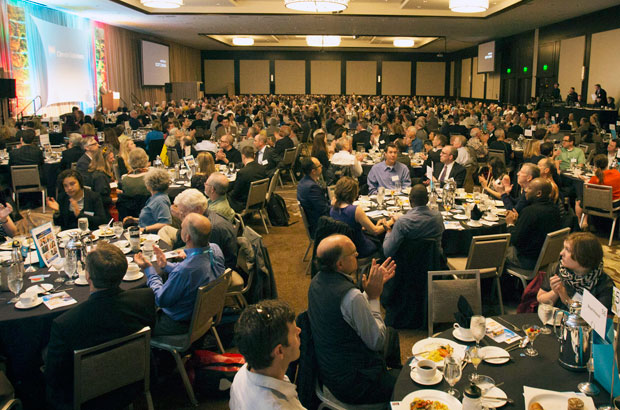Climate Solutions' annual breakfast in Seattle this week took place as our region is absolutely humming with climate activism of every sort. As a public groundswell pressures lawmakers to take action on cleaner fuels and carbon emissions, powerful coalitions continue chalking up victories in our fight to stop coal exports through our rivers, railways and ports.
Business engagement promoting meaningful climate action is at an all-time high. And when oil companies seek to ramp up their climate-threatening activities here—whether through increased transport of Tar Sands oil or hosting Shell's offshore drilling fleet—local communities and leaders are standing up to say no.
Speaking at the May 4th breakfast, Climate Solutions Executive Director Gregg Small made clear that our actions and our victories here rippled outward, growing our power and momentum towards an important transition. “Every time we say no here, it bolsters the chances that someone else’s no will prevail in their community." He added, "This is our moment to turn the enormous opposition to fossil fuels in our own backyard into an opportunity to build the kind of communities and the kind of region that we all want to live in.”
Local leadership on climate change
That message was echoed and enriched by each of the leaders who spoke on May 4th. Most prominently, it was Seattle Mayor Ed Murray who connected the dots between opposition to entrenched fossil fuel interests and the opportunities for our region moving towards sustainable prosperity. In his comments, Mayor Murray took the opportunity to throw a wrench into the gears of Shell Oil's plans to berth their Arctic oil drilling fleet at the Port of Seattle. Murray announces that the City’s Department of Planning and Development had detefound that the Port's current permits would not allow for moorage and maintenance of Shell’s drilling fleet.
Mayor Murray told the breakfast guests that “to prevent the full force of climate change, we need to turn our backs on the past—things like coal trains, oil trains, oil drilling rigs—and focus on creating a future of clean energy: electric cars and transit, green homes, vibrant environmentally progressive local businesses."
"If it were up to me," he continued, "there would be no place for Arctic off-shore oil drilling equipment here in Seattle." In announcing the city's decision that the Shell lease violated the Port's permits, he asked a broader, rhetorical question: "Is this really the right use of [our port]? Or should we use this opportunity to make a bold statement about how oil companies contribute to climate change, oil spills and other environmental disasters—and reject this lease?"
Turning climate opposition into climate opportunity
After the Mayor's comments, Climate Solutions' Gregg Small spoke about our organization's story, and the development of our advocacy for climate and clean energy solutions in the northwest. While rooted in the promotion of practical solutions for the growth of clean energy, our organization's campaigns expanded to take up direct fights against coal and oil interests as they threatened to turn our region into a climate-damaging fossil fuel superhighway.
"Our vision," Gregg,said, "is a single unified region, stretching from California to British Columbia, that is aligned in accounting for the cost of carbon in our economy, accelerating the clean energy economy, and breathing new life into climate action. This is our moment to turn the enormous opposition to fossil fuels in our backyard into an opportunity to build a thriving sustainable region that supports healthy communities for ourselves, our children, and our grandchildren. Leadership here in the Northwest can have global impacts through advocating for the most ambitious set of clean energy policies in the country; demonstrating the pathways to solutions through cutting-edge partnerships; and powering past fossil fuels."
This week at Climate Solutions, we've been celebrating the fact that, in our ongoing efforts to fight climate change and highlight progress in the northwest's transition from fossil fuels to a prosperous clean energy economy, we get to work alongside such an amazing array of climate champions.
There are so many great organizations allied in the fight; alongside local and regional groups such as OneAmerica, the Washington Environmental Council, Puget Sound Sage, Got Green, the Oregon League of Conservation Voters, Columbia Riverkeeper and many others. There are the many native communities who put themselves on the line in their fight to protect indigenous rights and the health of our environment. We are proud to stand with national organizations like 350.org, the Natural Resources Defense Council and Greenpeace, Finally, we are members of powerful regional coalitions of climate champions, including Power Past Coal, Stand Up to Oil, Renew Oregon, and the Alliance for Jobs and Clean Energy.
We're also hugely appreciative of the hundreds of Climate Solutions donors, whose contributions make our work possible and powerful. Nearly 800 of these climate champions were together this week for Climate Solutions' 7th Annual Breakfast in downtown Seattle, kicking off a week during which we raised more than $500,000 to sustain our efforts to organize our way past fossil fuels, to continue demonstrating realistic solutions through cutting-edge partnerships, and to advocate for the most ambitious set of clean energy policies in the country.
We know that, to change everything, it will take everybody. As Gregg noted in his breakfast comments, "success in these endeavors will require partnerships and a unity of diverse voices like we’ve never seen before – from labor unions, business allies, communities of color, faith organizations, health advocates, the environmental community, and many more."
Climate victories must be social justice victories
Rebecca Saldana, Executive Director of Puget Sound Sage, really hit home the need for broadly shared prosperity as we build the clean energy economy. She shared her personal story and experience growing up working for the rights of farmworkers and immigrants, and the connection to her leadership on climate equity and justice issues today. She’s helping to put in place strong, equitable climate policy that cuts carbon pollution and protects those that are impacted the most.
"For me," said Rebecca, "protecting our environment and advancing social and racial justice are one and the same. That is why solving the climate crisis centers on understanding that people of color, immigrants and refugees are first- and worst-impacted by climate change; and it requires a commitment to climate solutions that cap carbon, reduce pollution, and result in direct benefits for our front line communities. Winning climate solutions requires building stronger, deeper, more diverse partnerships to confront the powerfully overfunded opposition to our more clean and just economy."
The business community steps up on climate
Finally, Mindy S. Lubber, President of Ceres, discussed the role of business in protecting the global environment, and the role of business leaders not only talking about climate change but also advocating for specific policies. She also announced that Business for Innovative Climate and Energy Policy (BICEP) officially endorsed both Washington’s Alliance for Jobs and Clean Energy and the Renew Oregon coalition. A project of Ceres, BICEP is an advocacy coalition of dozens of large businesses committed to working with policy makers to pass meaningful energy and climate legislation that will help the nation rapidly transition to a low carbon, 21st century economy.
"I can tell you first-hand," said Lubber, "Congressional leaders on both sides of the aisle are concerned about climate change and they want to do something about it. But they need to hear from you – especially from business leaders. I hate to admit it, but groups like Ceres and Climate Solutions don't carry much weight in the halls in Congress. But companies have enormous clout – and we need to use it, and not be afraid to use it… It’s not just okay to talk about climate change, we MUST talk about climate change."
The work of building momentum, of moving from opposition to opportunity, doesn't stop. We can, we must, and we will continue to accelerate climate solutions, and make our corner of the world and our regional leadership have a global impact.
Thank you for championing the cause with us, and for helping us fuel the climate movement!





